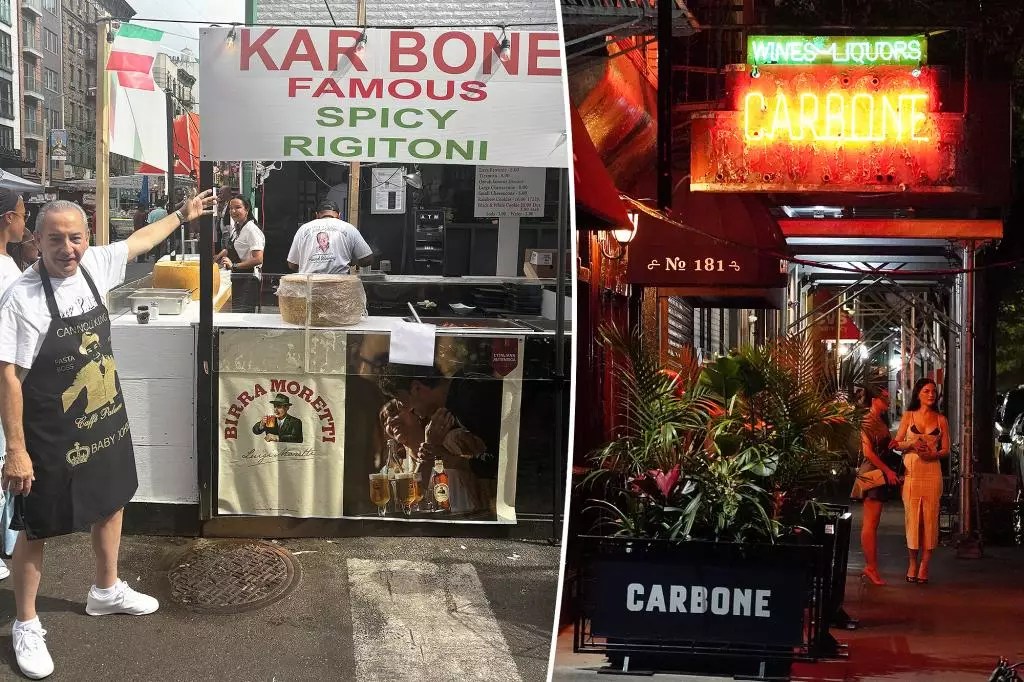In the vibrant heart of New York City’s Little Italy, a clash of culinary ambition is unfolding that blends nostalgia with modern marketing savvy. John “Baby John” DeLutro, a seasoned restaurateur renowned for his sweet treats at Caffe Palermo and savory delights at Baby John’s Pizzeria, has decided to launch an audacious campaign that aims to ride the coattails of a culinary phenomenon. The trendy Greenwich Village eatery, Carbone, famous for its spicy rigatoni and celebrity clientele, has inadvertently inspired DeLutro to assert his culinary prowess through a cheeky spin on its iconic dish.
DeLutro has set up a pasta stand at the annual Feast of San Gennaro, a two-week celebration steeped in Italian heritage, where he touts his “KAR BONE FAMOUS SPICY RIGITONI.” The blatant homage, or perhaps an impudent twist, to Carbone has raised eyebrows and sparked conversations about originality and culinary ownership. One cannot help but ponder the ethical implications of such a marketing strategy. Is this a playful homage or a blatant attempt to confuse consumers for financial gain?
The Legal Gray Area
Interestingly, DeLutro is not shy about his intentions, claiming to be on solid legal ground in his use of the name. He references a previous experience where a competitor utilized a similar tactic with cannoli—substituting ‘C’ with ‘K’—without facing repercussions. This begs the question of where the line is drawn in the culinary world between inspiration and infringement. DeLutro’s justifications highlight a broader conversation about the significance of branding in the restaurant industry. How much liberty can chefs take when replicating or drawing upon popular dishes without stepping into murky legal territory?
Moreover, the misspelling of “rigatoni” adds an additional layer of irony. DeLutro’s cavalier attitude toward traditional culinary practice might reflect a sense of camaraderie found within the vibrant street festival atmosphere, where innovation is often celebrated, albeit sometimes at the expense of authenticity.
An Opportunity for Exposure
The Feast of San Gennaro is an extraordinary occasion, attracting throngs of locals and tourists alike. DeLutro expresses hope that his culinary gamble will attract attention from curious visitors who recognize the famed Carbone name. While many may view his actions as a desperate grasp for relevance, it can also be interpreted as a shrewd business move amidst intense competition in the bustling food landscape of New York City.
Ultimately, DeLutro’s spirited assertion that he may serve a superior spicy rigatoni than that of Carbone adds an entertaining twist to the unfolding drama. The culinary community is rife with competitive spirits, but this move from “Baby John” underscores a relentless pursuit of identity and differentiation in an industry where culinary creativity reigns. The outcome of this provocative marketing tactic remains to be seen, but it certainly adds an exciting flair to an age-old battle between imitation and inspiration in the world of gastronomy.
As the festival draws to a close, one can only wonder—will DeLutro’s ‘KAR BONE’ venture pay off, or will it serve as a cautionary tale against the risks of culinary mimicry?







Leave a Reply